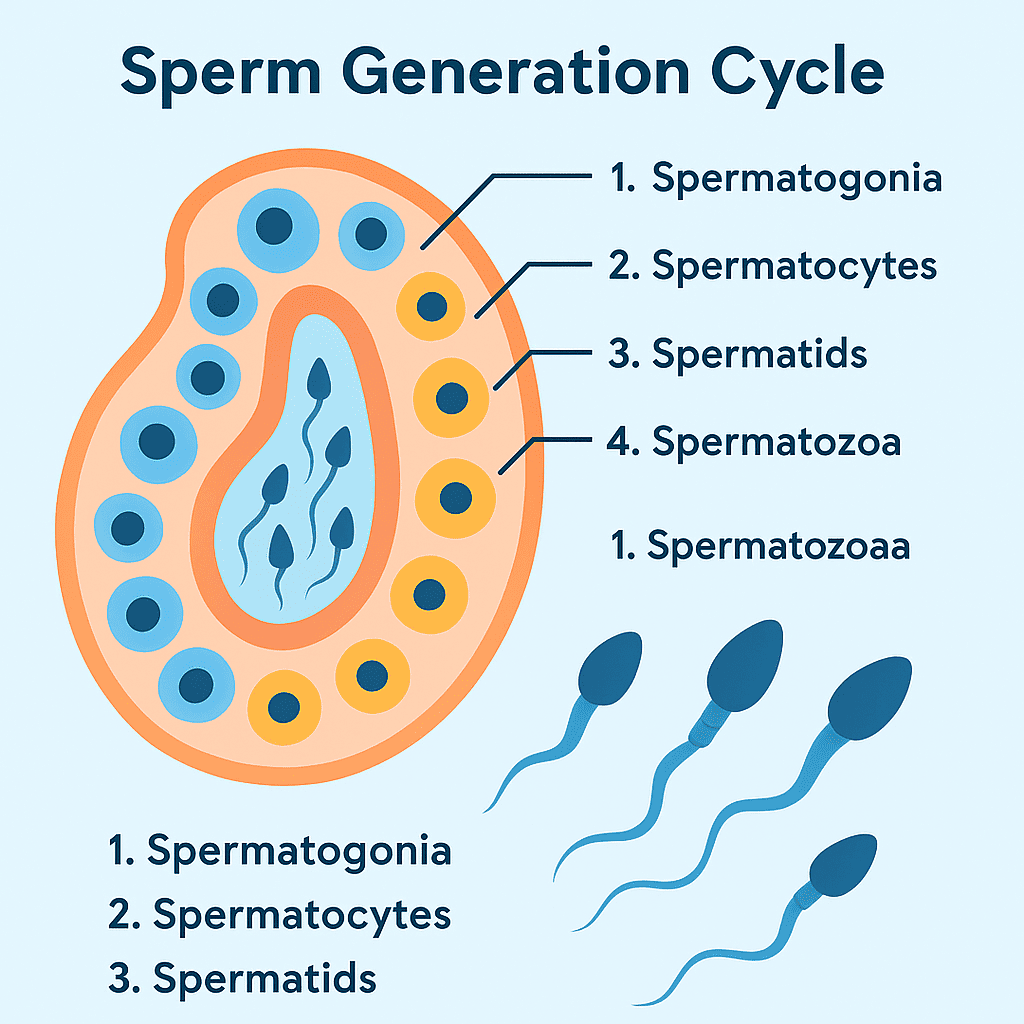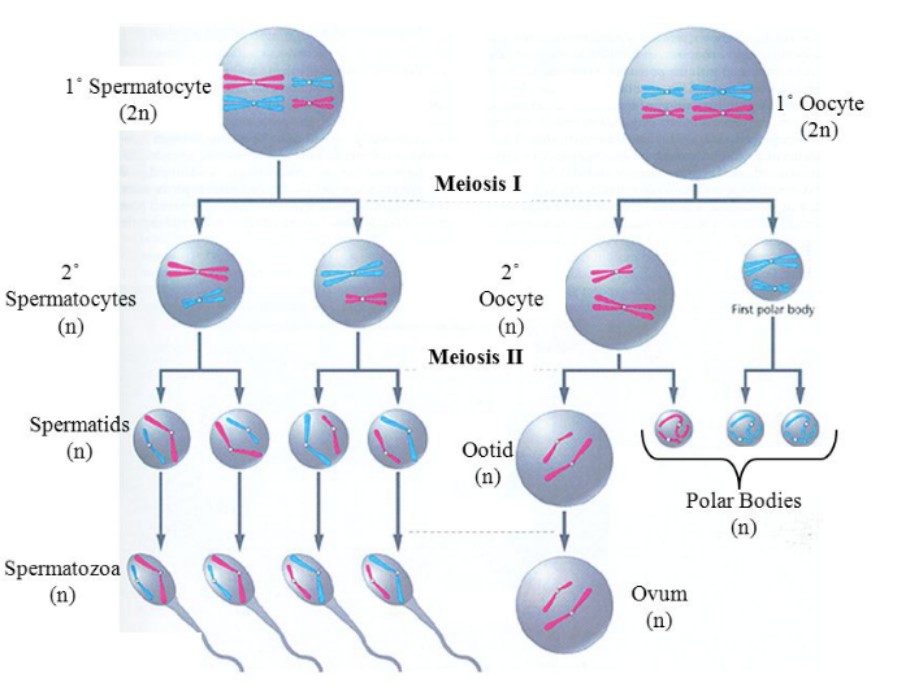
Male fertility is deeply connected to how the body produces, develops, and renews sperm. While many people assume sperm is created instantly, the truth is that the male reproductive system follows a precise and lengthy generation cycle. Understanding this process can make a significant difference, especially for couples in Pakistan who are planning pregnancy or undergoing treatments such as IUI or IVF.
This detailed guide explains how long sperm generation takes, how sperm is produced, what affects sperm quality, and how men can naturally support fertility through lifestyle choices. It also highlights when medical help becomes necessary and how the Fertility Center can support men dealing with male infertility, low sperm count, premature ejaculation, or erectile dysfunction.
What Is the Sperm Generation Cycle?
The sperm generation cycle refers to the complete process through which the male body produces new sperm. Unlike women, who are born with all their eggs, men continuously produce sperm throughout their lives. This production happens inside the testicles and continues through multiple phases until sperm becomes strong enough to fertilise an egg.
This cycle is known as spermatogenesis, and it involves the creation of new sperm cells, their transformation into mature sperm, and their journey through the reproductive system. The primary purpose of the generation cycle is to ensure that the male body always has a fresh supply of healthy sperm capable of supporting conception.
How Long Does It Take for Sperm Generation?
The complete sperm generation cycle takes significantly longer than most people expect. Although men produce sperm daily, the development of a fully healthy batch of sperm requires more than two months. On average, it takes around sixty to seventy days for sperm cells to form, grow, and undergo the initial stages of development inside the testicles.
After this, sperm travels to the epidermis, where it gains motility, strength, and the ability to fertilise an egg. This final stage of maturation takes about two additional weeks, bringing the total generation time to approximately seventy to ninety days.
This timeline is important because any positive or negative change in a man’s lifestyle or health does not impact sperm quality. Instead, results appear after one full generation cycle. This means healthier habits adopted today will show improvement after two to three months. Conversely, illness, stress, smoking, heat exposure, or hormonal imbalance today can reduce fertility weeks later.
This is especially important for men in Pakistan who are preparing for conception, semen analysis, IUI, or IVF. Understanding the generation cycle allows couples to plan more effectively and avoid frustration during fertility attempts.
How the Body Produces New Sperm

The sperm production process follows a highly coordinated structure inside the male reproductive system. Everything begins with specialised cells in the testicles called spermatogonia. These cells divide and grow, forming the earliest stage of sperm. Over time, they undergo structural changes, including the development of the sperm head containing DNA and the formation of the tail that allows movement.
Once initial development is complete, sperm enters the epidermis, a long coiled tube behind the testicle. Here, sperm matures, gains motility, and becomes fully capable of fertilising an egg. Only after completing this journey is sperm released during ejaculation.
The entire process is delicate and can be affected by hormonal balance, overall health, lifestyle habits, and environmental factors. This is why semen quality varies from person to person and why medical evaluation is often required in cases of infertility.
How Ejaculation Frequency Impacts Sperm Generation
A common question among men is whether frequent ejaculation affects sperm count or fertility. The truth is that ejaculation does not harm the generation process. The body continues producing new sperm regardless of how often ejaculation occurs. However, ejaculation frequency can influence the sperm volume present at any given time.
Ejaculating multiple times a day can temporarily reduce semen volume, but it does not reduce long-term fertility. On the other hand, abstaining for many days can increase semen volume but may reduce motility. For accurate semen analysis or conception attempts, doctors typically recommend abstaining for two to five days to allow an optimal buildup.
Understanding this balance helps couples plan better when trying to conceive and prevents unnecessary worry about normal sexual activity.
Why the Sperm Generation Cycle Matters for Fertility
Because sperm takes over two months to fully regenerate, any event that affects the body today will influence sperm quality several weeks later. Illnesses like fever or flu, episodes of stress, lack of sleep, poor diet, smoking, or exposure to heat can all reduce sperm motility, count, or DNA quality.
For couples hoping to conceive naturally or through assisted techniques such as IUI or IVF, it is essential to consider this generation window. Men should adopt healthy habits at least three months before planned fertility attempts to ensure their best possible sperm quality.
This timeline also explains why some men experience fluctuating semen analysis results. If a test is repeated too soon, it may not reflect real improvement. Giving the body enough time to complete the generation cycle often leads to more accurate assessments.
Understanding Sperm Quality: Count, Motility, Shape, and DNA Health
Sperm quality is not determined by a single factor. Healthy sperm must have a good count, meaning a sufficient number of sperm in the semen sample. Motility is equally important, referring to the sperm’s ability to move properly toward the egg. Shape, or morphology, affects the sperm’s ability to fertilize.
DNA integrity plays a crucial role, as damaged DNA can reduce the chances of pregnancy and increase the risk of miscarriage. Environmental stress, unhealthy habits, and medical conditions can all negatively affect these parameters.
In Pakistan, sperm quality issues are increasingly common due to smoking, vaping, stress, poor diet, pollution, and hormonal imbalance. Understanding the factors behind sperm quality helps men make proactive improvements and seek medical help when needed.
How Long Can Sperm Survive Inside and Outside the Body
Sperm behaves differently depending on where it is located. Inside the female reproductive tract, sperm can survive for up to five days under fertile conditions. This is why conception can occur even when intercourse happens several days before ovulation. Outside the body, sperm survival is much shorter. On skin or clothing, sperm typically dies within minutes to an hour. In water such as showers, swimming pools, or bathtubs, sperm loses viability almost immediately and cannot cause pregnancy. Frozen sperm, used for IUI and IVF, can remain viable for many years when stored under controlled conditions.
These facts help clear common misconceptions and reassure couples who may worry unnecessarily about accidental pregnancy risks.
How Sperm Generation Can Be Supported Naturally
Healthy lifestyle habits can significantly improve the sperm generation cycle. A balanced diet with essential nutrients, regular exercise, controlled stress levels, adequate sleep, and avoidance of smoking, vaping, and alcohol can all support better fertility. Reducing heat exposure—such as tight clothing, prolonged sitting, or keeping laptops on the lap—also protects testicular function.
Men should also limit pornography and unhealthy sexual habits, which can affect psychological and hormonal balance. Medical supplements can support fertility but should only be taken under professional guidance to avoid complications.
When Poor Sperm Generation Becomes a Concern
Some men may notice symptoms that suggest impaired sperm generation. These include low libido, difficulty maintaining erections, history of testicular injury, hormonal symptoms such as fatigue or mood changes, and consistently abnormal semen analysis results. If a couple has been trying to conceive for six to twelve months without success, evaluation by a male fertility specialist becomes essential.
Medical intervention helps identify underlying issues such as varicocele, hormonal imbalance, infection, or lifestyle problems that interfere with fertility.
Medical Treatment Options for Improving Sperm Quality
Several medical approaches are available for men experiencing infertility. Depending on the diagnosis, treatment may include hormonal therapy, antioxidant medication, antibiotics for infections, varicocele correction, or specialised programs that improve sperm motility and count. In cases where natural conception is challenging, options like IUI or IVF may be recommended.
A customized treatment plan based on individual symptoms and laboratory results offers the best chance for improvement.
Trusted Treatment for Male Infertility and Sexual Health
Nasim Fertility Center, led by Dr. Farooq Nasim Bhatti, offers expert care for men dealing with infertility, low sperm count, hormonal imbalance, erectile dysfunction, premature ejaculation, and other reproductive health issues. Dr. Farooq Nasim Bhatti is Pakistan’s first and only American Board-Certified Medical Sexologist, bringing more than thirty years of experience and thousands of successful patient outcomes.
At Fertility Center, men receive advanced diagnostic testing, hormone evaluation, semen analysis interpretation, and customized treatment plans designed to improve sperm generation and fertility. Patients from all major cities, including Lahore, Islamabad, Karachi, Faisalabad, Multan, Sahiwal, and Peshawar, rely on Fertility Center for discreet, confidential, and evidence-based care.
Whether you are preparing for natural conception, IUI, or IVF, Nasim Fertility Center provides guidance and treatment that help men restore their reproductive health and confidence.
Frequently Asked Questions About Sperm Generation and Fertility
How often does the body make new sperm?
The body produces sperm every day, but complete generation requires over two months.
Does masturbation affect sperm count?
Masturbation does not harm long-term fertility but may temporarily reduce semen volume.
Can stress lower sperm quality?
Chronic stress affects hormones and can significantly reduce sperm count and motility.
Does illness such as fever affect sperm generation?
Fever or viral infections, including COVID-19, can damage sperm for up to three months.
How long after lifestyle changes will sperm quality improve?
Most improvements appear after seventy to ninety days, once a full generation cycle is complete.
Summary
The sperm generation cycle plays a crucial role in male fertility. Because sperm takes more than two months to develop, every habit or health event impacts fertility weeks later. Understanding this cycle helps men plan better for conception, improve lifestyle choices, and recognise when medical guidance is necessary. With expert evaluation and treatment, most fertility issues can be improved.
Nasim Fertility Center is dedicated to helping men across the country understand their reproductive health and receive reliable, confidential, and effective treatment.
References
Griswold, M. D. (2016). Spermatogenesis: The commitment to meiosis. Physiological Reviews. (Discusses human spermatogenesis duration ~74 days and cycle timing.) PMC
Encyclopaedia Britannica. (2025). Spermatogenesis | Description & Process. Britannica. (Explains spermatogenesis and ~74-day maturation timeline.) Encyclopedia Britannica
World Health Organization (WHO). (2021). WHO laboratory manual for the examination and processing of human semen (6th ed.). World Health Organization. World Health Organization
Björndahl, L., et al. (2022). The sixth edition of the WHO Laboratory Manual for the Examination and Processing of Human Semen. Fertility and Sterility. (Explains updates and standardisation in the WHO 6th edition.) ScienceDirect
Schlegel, P. N. (2024). We are giving the wrong patient instructions for semen analysis. Fertility and Sterility. (Notes WHO recommendation for 2–7 days abstinence for semen analysis.) fertstert.org
Yao, G., et al. (2025). Association of abstinence time with semen quality in men who… [Open-access article] (Summarises WHO 2–7 day abstinence recommendation and compares guidance.) PMC
Okada, F. K., et al. (2020). One day is better than four days of ejaculatory abstinence for… Reproduction and Fertility, 1(1). (Discusses abstinence windows and semen outcomes; cites WHO 2–7 days.) raf.bioscientifica.com
Mayorga-Torres, B. J. M., Camargo, M., Agarwal, A., & du Plessis, S. S. (2015). Influence of ejaculation frequency on seminal parameters. Reproductive Biology and Endocrinology, 13, 47.
https://doi.org/10.1186/s12958-015-0045-9 SpringerWelliver, C., et al. (2016). Analysis of semen parameters during 2 weeks of daily ejaculation: a first in humans study. Translational Andrology and Urology, 5(5), 749–755. https://doi.org/10.21037/tau.2016.08.20 PubMed
Mayo Clinic. (n.d.). Sperm: How long do they live after ejaculation? Mayo Clinic. (Sperm survival ~3–5 days in female reproductive tract.) Mayo Clinic
Kölle, S., et al. (2022). Sperm–oviduct interactions: Key factors for sperm survival and selection. [Open-access review] (Notes human sperm can maintain fertilising capacity ~4–5 days in the oviduct under supportive conditions.) PMC
Sheynkin, Y., Jung, M., Yoo, P., Schulsinger, D., & Komaroff, E. (2005). Increase in scrotal temperature in laptop computer users. Human Reproduction, 20(2), 452–455. https://doi.org/10.1093/humrep/deh616 PubMed
Sharma, R., Harlev, A., Agarwal, A., & Esteves, S. C. (2016). Cigarette smoking and semen quality: A new meta-analysis examining the effect of the 2010 WHO laboratory methods. European Urology, 70(4), 635–645. (Smoking associated with reduced sperm count/motility.) PubMed+1
Gollenberg, A. L., et al. (2010). Semen quality in fertile men in relation to psychosocial stress. Fertility and Sterility. (Stressful life events associated with decreased semen quality.) PubMed
Ilacqua, A., Izzo, G., Emerenziani, G. P., Baldari, C., & Aversa, A. (2018). Lifestyle and fertility: The influence of stress and quality of life on male fertility. Reproductive Biology and Endocrinology, 16, 115.
https://doi.org/10.1186/s12958-018-0436-9 Springer+1Carlsen, E., et al. (2003). History of febrile illness and variation in semen quality. Human Reproduction, 18(10), 2089–2092. (Fever associated with temporary declines in semen parameters over subsequent weeks.) OUP Academic
Sergerie, M., et al. (2007). High risk of temporary alteration of semen parameters after recent acute febrile illness. Fertility and Sterility. (Febrile episodes can affect semen parameters and sperm DNA integrity.) ScienceDirect
Szell, A. Z., Bierbaum, R. C., Hazelrigg, W. B., & Chetkowski, R. J. (2013). Live births from frozen human semen stored for 40 years. Journal of Assisted Reproduction and Genetics. (Demonstrates decades-long viability in cryostorage.) PMC
Brigham and Women’s Hospital. (n.d.). Sperm preservation (sperm freezing/cryopreservation). Brigham and Women’s Hospital. (Clinical guidance: frozen sperm can last decades; reports of births from sperm frozen 40 years.)
Disclaimer
This information is for educational purposes and not the treatment. For treatment, you need to consult the doctor.

Dr. Farooq Nasim Bhatti (MBBS, FAACS – USA, Diplomate: American Board of Sexology, CST, HSC – Hong Kong, CART – Malaysia & China) is a qualified medical sexologist with 30+ years of experience. He has presented 21+ research papers internationally and treats sexual dysfunction through sex therapy, counseling, and pharmacotherapy to restore natural sexual function without temporary medication.

Regain Confidence with Our ED Solutions
Explore effective treatments for erectile dysfunction. Take charge of your intimacy today.



